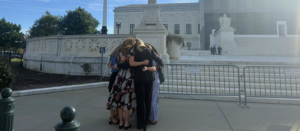When I was younger, Saturday mornings were sacred. I would crawl out of bed, shuffle to the pantry in mismatched socks, snatch an expired fruit snack, and plop down on the couch to watch Scooby-Doo.
Same plot every time: a monster terrorizes the innocent, the Mystery Gang investigates, and in the final scene—mask off—the monster is someone hiding in plain sight.
But as I grew up, I began to realize that in real life, the masks stay on many times. Some evil doers don’t even bother with masks. It is unsettling when you finally realize the monsters don’t hide under your bed. Sometimes they run oppressive governments and plan massacres, while smiling for family photos.
That thought forces us to confront a reality most people spend their lives avoiding— the depravity of man isn’t just an old doctrine buried in creeds. It actually helps explain how many of those nightmares turned into history.
A week ago, I walked through the Nova Exhibition, in Washington, D.C., — the educational exhibit and memorial to the October 7th massacre in Israel – where hundreds of innocent festival attendees were murdered by Hamas terrorists. It was quiet but heavy. Photos, videos, bloodstained tents. Faces frozen in joyful moments before they were erased. Then came the repeated sound of malicious gunshots.

A few days later, I decided to visit the Holocaust Museum. Shoes piled high, names etched on cold walls, grainy footage of mass graves displayed on an endless loop. Same evil. Different uniforms. Anger sets in.
I walked out both times with a question burning in my gut: Where does this kind of rage fit in a Christian life?
The sanitized version of Christianity—coffee shop, Instagram filtered theology—does not hold up when you have stared real evil in the face. When innocent people are hunted, trafficked, slaughtered—love your enemies becomes more challenging than ever. Jesus told us to pray for those who persecute us and leave vengeance to God.
Taken as a whole, therefore, we should not make the mistake of thinking God is passive. He is a God of justice. In one of the imprecatory Psalms (psalms that call down God’s anger and judgement), David prayed for his enemies to be blotted out. The prophets begged for justice, not pleasant conversations. Jesus stormed the temple with a whip. And Revelation? It certainly does not present a weak, passive Gospel. The King returns with fire in His eyes, blood on His robes, and a sword that cuts through the world’s evil.
There is a tension that is difficult to comprehend: God is fully merciful and fully just. He alone is God. But we must be careful. We are not God. Human rage, while understandable, can rot us from within.
Sometimes I wonder if my anger masks something darker—a fear that maybe I am not so different from the monsters about which I read. I want to say I’d never take joy in someone else’s pain. But if I’m honest, I want those terrorists to suffer for what they did. I might even feel satisfied to know they are paying for it. In a way, that scares me though, because if I claim moral superiority while thirsting for vengeance, how am I different?
Mary Shelley’s Frankenstein has lingered with me for years, because it is a story not just about monsters, but about what happens when man tries to play God.
Man claims God’s power over life and massacres babies.
Man claims His authority over identity and mutilates children.
Man claims God’s vision for love and watches pornography.
Man claims control over himself aside from God and spirals into anxiety and despair.
Similarly, when we claim God’s vengeance for ourselves, we don’t destroy evil; we become it. And then, like Frankenstein’s monster, we reach that bitter truth: “When the images this world affords first opened upon me, I should have wept to die; now it is my only consolation.”
We must guard ourselves from such despair. I see it among my generation.
Many are walking through life with hollow eyes and invisible wounds. They scroll through images of war, assault, and despair—and quietly conclude that the world is beyond saving, and they are, too. When you consider the world apart from God, justice feels absent; evil feels unstoppable, and death feels like an escape.
The problem is not anger itself, but where it can take us. Do we let it rot into hate? Does it tempt me to claim what belongs only to God? Or does it sharpen my longing for true justice and good—the kind only God can bring?
Scripture makes room for both grief and grit. For righteous anger and radical restraint. For aching prayers of justice—and trembling gratitude that I am not the one holding the sword.
We must look to Christ. In Him mercy collides with justice. That is the mystery of grace. The same Savior who allowed Himself to be crushed in our place to bring life to us will return one day to establish His justice forevermore. We need not carry the burden of evil. It was defeated on the cross. So, what do we do with our anger towards the ever-present evil in our world as we wait for the glorious day of Christ’s return?
We pray the imprecatory Psalms—with trembling.
We long for justice—and trust the Judge.
We fight the monsters with everything we’ve got.
And through it all, we cling to the reality that God sees everything, knows everything, and He alone will bring a justice that is final, holy, and utterly beyond corruption.






